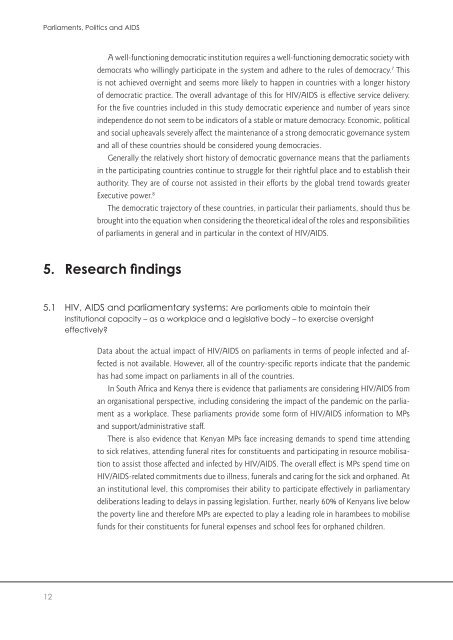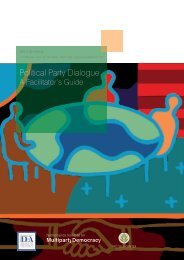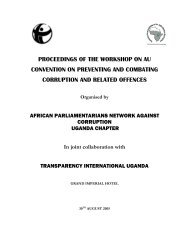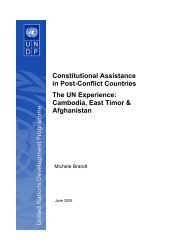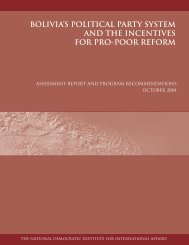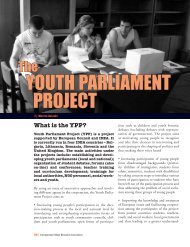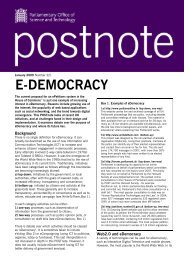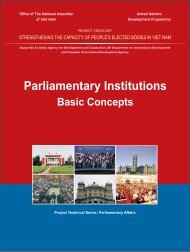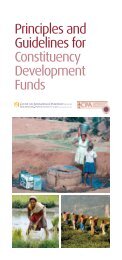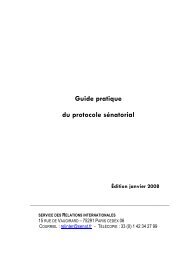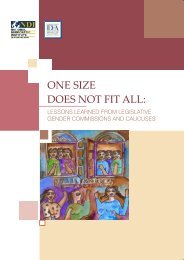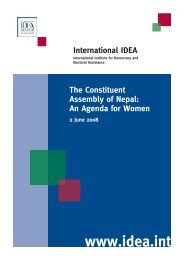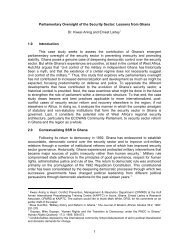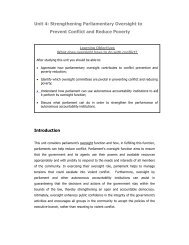Download PDF - Parliamentary Centre
Download PDF - Parliamentary Centre
Download PDF - Parliamentary Centre
- No tags were found...
You also want an ePaper? Increase the reach of your titles
YUMPU automatically turns print PDFs into web optimized ePapers that Google loves.
Parliaments, Politics and AIDSA well-functioning democratic institution requires a well-functioning democratic society withdemocrats who willingly participate in the system and adhere to the rules of democracy. 7 Thisis not achieved overnight and seems more likely to happen in countries with a longer historyof democratic practice. The overall advantage of this for HIV/AIDS is effective service delivery.For the five countries included in this study democratic experience and number of years sinceindependence do not seem to be indicators of a stable or mature democracy. Economic, politicaland social upheavals severely affect the maintenance of a strong democratic governance systemand all of these countries should be considered young democracies.Generally the relatively short history of democratic governance means that the parliamentsin the participating countries continue to struggle for their rightful place and to establish theirauthority. They are of course not assisted in their efforts by the global trend towards greaterExecutive power. 8The democratic trajectory of these countries, in particular their parliaments, should thus bebrought into the equation when considering the theoretical ideal of the roles and responsibilitiesof parliaments in general and in particular in the context of HIV/AIDS.5. Research findings5.1 HIV, AIDS and parliamentary systems: Are parliaments able to maintain theirinstitutional capacity – as a workplace and a legislative body – to exercise oversighteffectively?Data about the actual impact of HIV/AIDS on parliaments in terms of people infected and affectedis not available. However, all of the country-specific reports indicate that the pandemichas had some impact on parliaments in all of the countries.In South Africa and Kenya there is evidence that parliaments are considering HIV/AIDS froman organisational perspective, including considering the impact of the pandemic on the parliamentas a workplace. These parliaments provide some form of HIV/AIDS information to MPsand support/administrative staff.There is also evidence that Kenyan MPs face increasing demands to spend time attendingto sick relatives, attending funeral rites for constituents and participating in resource mobilisationto assist those affected and infected by HIV/AIDS. The overall effect is MPs spend time onHIV/AIDS-related commitments due to illness, funerals and caring for the sick and orphaned. Atan institutional level, this compromises their ability to participate effectively in parliamentarydeliberations leading to delays in passing legislation. Further, nearly 60% of Kenyans live belowthe poverty line and therefore MPs are expected to play a leading role in harambees to mobilisefunds for their constituents for funeral expenses and school fees for orphaned children.12


